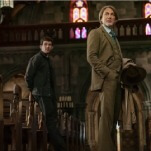The scorn suffered by gays and lesbians past and present is mitigated to some degree by the excitement of sharing secret rituals and the de facto approval of a rich subculture. Graham Robb's historical survey Strangers argues that it might be a fair trade. Robb seeks to recontextualize a large chunk of gay and lesbian history by proving that acceptance of homosexuality is hardly a recent phenomenon, and he takes as his guiding principle the idea that historical gay studies shouldn't be reduced to stories of criminal prosecution and sordid skulking.
The first third of Strangers examines the legal and social status of homosexuals in the 19th century, finding that while the situation was far from ideal, the general policy of European and American authorities maintained that gays and lesbians were an inevitable aberration, best ignored. Many government officials encouraged the press to keep the facts of sodomy trials quiet, lest otherwise-straight men and women be tempted to give homosexuality a try. The second section deals with how this "keep it to yourself" principle played out in daily life, as a network of clubs and code words developed (including quaint, long-lost labels like "Uranist" and "invert") and storied romances were born out of the feeling of relief that overwhelmed many people upon finding partners of like desires.
But Robb really lights up when he reaches Strangers' third section. He begins with some stirring analysis of overt and covert gay texts, like the works of Hans Christian Anderson, whose ugly ducklings and naked emperors were metaphors for his fear of being exposed as an outsider. From there, Robb reexamines the Biblical take on homosexuality, describing the 19th-century trend toward depiction of a gay Jesus, which led to the "manly Christ" evangelical movement.
Robb wraps the book with a close reading of Edgar Allan Poe and Arthur Conan Doyle, two straight men whose most famous creations, Auguste Dupin and Sherlock Holmes, are to Robb's eyes clearly—if not openly—gay. Matching up the key terminology and euphemisms of the day, Robb makes his case convincingly, and uses this revelation to make a couple of larger points. Robb is interested in how gay men make great detectives because of their forced connection to the underworld, but he's more heartened at the model Poe and Doyle created for literature's gay characters, who have neither to announce their sexuality, nor to be defined by it.








































